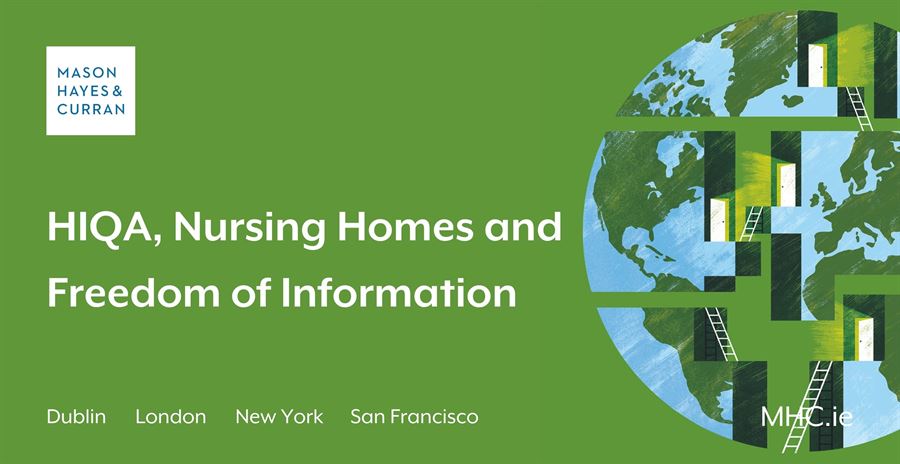HIQA, Nursing Homes and Freedom of Information

The Health Information and Quality Authority (HIQA) is an independent statutory authority responsible for promoting safety and quality in the provision of health and personal social services. One of its roles is the regulation of residential care services for older people, whether provided in nursing homes managed by the HSE or a private provider.
Like every statutory authority, HIQA is subject to the Freedom of Information Act 2014 (FOIA). Therefore, when submitting information to HIQA, or responding to requests for information from HIQA, it is important to be aware that information could be the subject of a freedom of information (FOI) request, for example, from a journalist.
The FOIA provides a right of access to records held by FOI bodies. This means that any person or entity can make a request for any record held by an FOI body. HIQA is a frequent recipient of FOI requests, as can be seen from its 2020 FOI Requests Disclosure log, which is available here.
As may be seen from the Disclosure log, nursing homes were a common subject of FOI requests throughout 2020. There were twelve FOI decisions made by HIQA relating to nursing homes, ten of which were in response to requests from journalists. The information requested related primarily to the COVID-19 pandemic, including response measures and infection control.
The information requested and released broadly fell into the following categories:
-
General correspondence, for example, letters, emails, and attendance notes,
-
Concerns from members of the public, nursing home employees, and relatives of residents of nursing homes,
-
Specific documentation, for example, the Framework of Information on Designated Centres,
-
Outcomes and determinations, and
-
Lists of certain information, for example, nursing home names and receipt dates of specified information.
Out of these twelve decisions made by HIQA, all requests, bar one, were either fully or partially granted to the requester. Nursing home operators may therefore wish to take this into account when submitting information to HIQA.
The FOIA, while creating a right of access to records, also contains a number of exemption provisions. Exemption provisions are conditions under which certain records could be deemed exempt from release. Depending on the content of the record, it may be partially released, or refused completely.
In this context, the most relevant exemption provisions are likely to include:
-
Information obtained in confidence: Information withheld under this exemption relates to records containing information given to HIQA in confidence and on the understanding that it would be treated as such. Therefore, when submitting information to HIQA, it may be appropriate to request HIQA to confirm, prior to information being submitted, that it will be treated as having been received in confidence. This may not always be necessary or applicable but is worth considering in suitable situations.
-
Deliberations of FOI bodies: Information which can be withheld under this exemption relates to matters currently under deliberation by HIQA. For example, where HIQA is currently considering submissions of a nursing home in relation to an inspection, any information relating to the inspection could be exempt while those deliberations are ongoing.
-
Commercially sensitive information: Information withheld under this exemption relates to commercially sensitive information, the disclosure of which could reasonably be expected to result in a material financial loss/gain or prejudice the competitive position of the person to whom the information relates. Again, where relevant, a nursing home should expressly state, at the time of provision to HIQA, that the information being submitted is commercially sensitive.
-
Personal information: Information withheld under this exemption relates to records containing the name(s) of individual(s) and/or other data which would identify an individual. In many cases, HIQA will request that no personal data is submitted to it. However, where it is necessary to submit personal data, this should be clearly identified to HIQA to enable it to take appropriate steps to protect this information.
-
Protected Disclosures: Information withheld under this exemption relates to records that may reveal the identity of a source of confidential information.
Conclusion
When providing any information to HIQA, it may be worth drawing HIQA’s attention to the likely applicability of any of the above exemption provisions, should an FOI request be received. In particular, when submitting confidential or commercially sensitive information, this should be made clear to HIQA at the time of submission. This will make HIQA’s task of reviewing information in response to FOI requests easier.
Finally, if requested by HIQA for submissions in relation to an FOI request received by it, it is always a good idea to make such submissions.
If you would like assistance with these, please contact Catherine Allen.
The content of this article is provided for information purposes only and does not constitute legal or other advice.
Share this:




